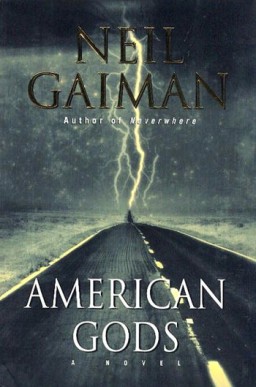
Holidays are not a good time for downer reads. I knew this in theory, but it really sank in when, during a week in a beach house surrounded by my best friends, I attempted to read a book featuring a love story between a suicidal junkie and a needle exchange volunteer. Can you even imagine? I got, to my credit, a third of the way through it, before putting a pin in it and scanning back through my Kindle for a more holiday-friendly re-read. American Gods is what I came up with.
For me, a lover of fantasy generally and of Neil Gaiman in particular, diving back into this novel was like that first gulp of Friday night wine after a long, stressful working week. The premise, simply put, is that all of the gods ever worshipped by humans really exist; belief somehow generates them, and, since every culture eventually ends up in America, their adherents have brought them all there at some point. Celtic, Hindu, African, and Norse gods; gods of plain and forest, of cave and river, of snow and fire. They’ve all been gradually forgotten, and now scrounge an existence as best they can in the great melting-pot. (Jesus does have a cameo as well, though he isn’t named. Predictably, he’s done very well in America, though he isn’t happy with what American belief has shaped him into.)
Into this environment stumbles a protagonist we only ever know as “Shadow”, an ex-con with a mostly-dead wife who is recruited as a general dogsbody by a mysterious stranger calling himself “Mr Wednesday”, after the day on which they met. (If you think for half a second about the etymology of that day of the week, you should be able to solve the mystery more quickly than Shadow.) Wednesday’s self-imposed mission is to press-gang the old gods into a war against a pantheon of new ones, which have been created by more modern forms of worship: television, freeway, media, technology, all the things to which people devote their time and, occasionally, blood (whether their own or others’).
At this point, the whole show could have devolved into an over-written satire about the deification of technology in modern life, and been a real clunker (or “klunker” – that’s an in joke for those who’ve read the book). Mercifully Gaiman, rather than pitching his tent in that well-trodden bog, makes the book work as, first and foremost, a straight fantasy novel. It gallops along beautifully on that level, and is a ripper of a story with a twist at the end that manages to be both surprising and well-foreshadowed. There’s even a small town mystery story sub-plot involving likeable but enigmatic characters, which gives the plot a middle-American grounding, rather than dragging the reader across the country like an unwilling teenager on a family road-trip to recruit obscure Slavic deities*.
Over the last ten years or so, rumours of a movie have been continually shot down, but it does look like there might finally be a TV series, possibly next year. Cautious optimism applies; to anyone who might be tempted to watch, I BEG you to read the book first.
*Except for the Slavic deities, I have been that teenager.